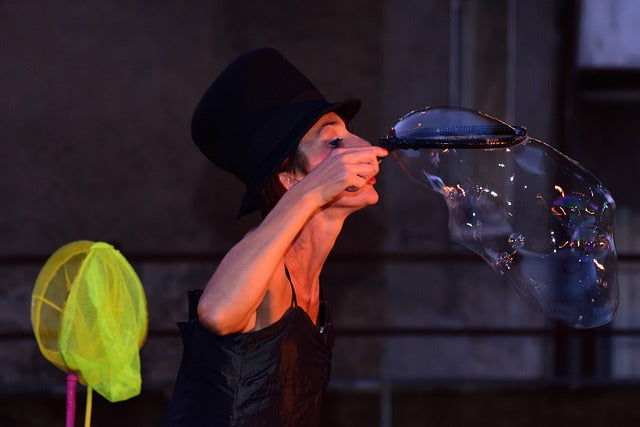About Us - History
The man who put a smile back on Britain's face
A few years back, I stopped one sunny afternoon in London's Covent Garden to see what or who had attracted the crowd that was forming. I found a tall slim young man with bushy hair, wearing stilts, in the process of attaching a plastic duck to a long piece of string. He started whirling his makeshift prop round and around in ever widening circles over the heads of the crowd. Eventually he shouted, "Duck!" And, of course, we all did. Once he had got us laughing and got our attention, the bushy-haired young man proceeded to juggle an amazingly large number of balls while walking around on his stilts.
The madcap humour, as well as the prodigious juggling skills, belonged to Phillip Maxwell-Stewart, better known to audiences by his stage name of Max Oddball. Today, Max is still just as tall, just as madcap, and just as passionate about juggling (although the bushy hair-do has thinned out a little). But Max is famous for much more than entertaining crowds.
For it was Max Oddball who was instrumental in bringing about the modern revival of interest in juggling in Britain when he opened Europe's first juggling shop in London 25 years ago and organized the very first British Juggling Convention in London in 1988. Today, Max has juggling shops in London's Camden Lock and in Brighton, selling everything from bean bags to unicycles and from diabolos to fire sticks and he spends his life encouraging everything to do with his first and last love - juggling.
Childhood wasn't always easy for Max and his entry into the world of juggling was anything but conventional. 'I became a professional juggler in order to hide,' he admits candidly. 'I used to juggle 10 to 12 hours every day - I hid in juggling as it was the first successful thing I'd done in my life. As a child I had failed at school because I was dyslexic - I didn't read my first book until I was 15!'
'I'm pretty good at lateral thinking and at decision making,' says Max, 'but names and dates are not my forte - and school is predominantly about names, dates and writing, so I wasn't successful in a conventional sense. But I excelled at juggling and soon had my own show. I worked with a number of circuses and had a number of TV appearances including shows like Lovejoy and Richard & Judy. BBC TV filmed a program link of me juggling that was shown more than 2000 times.'
'But although I hid in juggling, what I really wanted was human contact and that was when I opened the first shop. It was through coming into contact with customers who felt just as passionate about juggling I did that I really made contact with my audiences - and that is what Oddballs is all about.'
Max says that he found the celebrity that TV brings rather disconcerting. 'Yes it's great to be congratulated on a good performance but that tends to put you on a pedestal and distances you from people. Whereas what I really wanted was to be on the same wavelength with other people who feel as passionate about juggling as I do. And that's where Oddballs the shop is so important to me.'
'From there I also got into teaching and that was great but once again it tends to distance you from people, whereas a shop brings you into contact with people on a one to one basis and reminds you that they might know something you don't know!'
'I liked being a teacher and I taught a lot - I did month's courses and week's courses - I filled two sports halls with jugglers every Sunday from 2 until 5. And I started the British Juggling Convention in 1988. But being a shopkeeper is the real me. And, let me tell you, a shop is like a living soap opera!'
'The reason that the Oddballs shops have worked so well is because we seem to have a passion that goes beyond just selling the goods in the shop window - it's a passion for everything to do with juggling.'
One big surprise is just who visits the shops in search of juggling skills. 'It's a complete cross section', says Max. 'we literally get businessmen in Rolls Royces turning up at the shop in pinstripe suits. We get doctors, we get firemen, policemen and even people with no shoes! We have one prominent customers from the Metropolitan Police who handles two diabolos extremely well.'
Today, Max is passing on his skills and enthusiasm to a new generation of jugglers. Lads like Andrew Pole, voted British Young Juggler of the Year 2007 and Freddy Sheed, winner of the Junior Gold Prize at the World Juggling Federation, who are frequent visitors to his shops and who both receive encouragement and pass on their own skills to others.
Like many visitors to Max's domain I leave with three juggling balls and a how-to-juggle video featuring a certain tall, bushy-haired young man, pressed upon me enthusiastically by Max. And yes, I am practising, and no, I can't do two balls at once - yet.
Max chuckles when he recalls the old days in Covent Garden and his mad joke with the plastic duck. 'The great thing about a silly gag like the duck.' He says, 'is that it breaks down all the barriers - everyone is laughing and more important they are enjoying each other's laughter as well.'
'I think Oddballs has genuinely touched many, many people over many, many years. It's the same as when you read a good book or watch a good film - the joy that comes out of that comes about because you are doing, instead of thinking. Juggling gives you the same joy because juggling takes over and is all about doing rather than thinking.'

